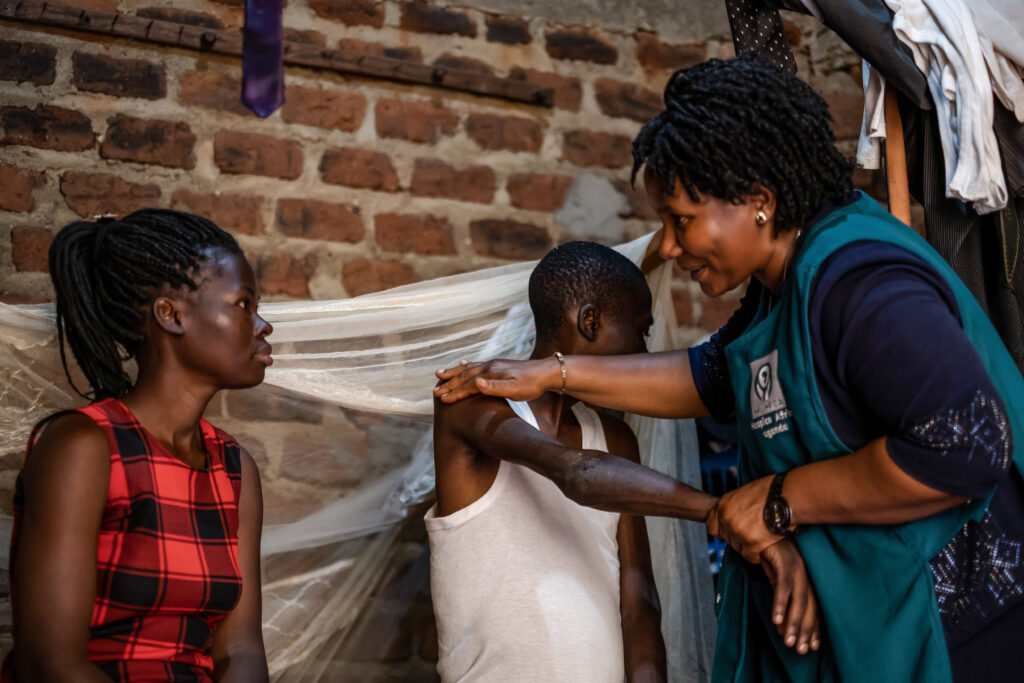In a small home in Uganda’s capital, Jane Mwesige, a nurse with a hospice that has transformed African end-of-life care, breaks into a gospel song about surrendering to God, a favourite of her patient Jonathan Luzige.These home visits, combining affordable medical care and spiritual support, are part of Mwesige’s routine with Hospice Africa Uganda.Founded in 1993 by Dr Anne Merriman, it brought holistic end-of-life care to Uganda at a time when it was offered in only three African countries.By the time Merriman died this May, aged 90, she had treated more than 40,000 Ugandans and her model had spread to 37 countries on the continent.In his worn-brick home, Luzige’s colon cancer makes it difficult to move, but he eagerly joins in the singing.”I feel very happy, and it made me feel stronger knowing there are people who are able to care for me,” said Luzige, 30.”Palliative care is all about taking care of patients,” said Mwesige. “Every one of us, or one of our relatives, may need the service.”- A simple solution -Born in Britain to Irish parents, Merriman trained as a doctor and became a nun before leaving her order to help establish palliative care in Singapore.When she arrived in Uganda, it was in the grips of the HIV/AIDS epidemic and she had raised only enough charitable funding for three months of work and a skeleton crew.The famously persuasive Merriman convinced Uganda’s government to allow the import of morphine powder, which she used to make an oral solution she had developed in Singapore.Simple enough to make in a bucket over her kitchen sink, it became invaluable to thousands. Hospice Africa Uganda, which now runs from a mix of NGO and charitable funding, distributes the solution in recycled plastic bottles for free to hospitals and clinicians.Facing a shortage of doctors, Merriman also campaigned to change the law so nurses could prescribe the morphine and bring it directly into people’s homes.She became known locally as the “jaja” (“grandmother”) of palliative care in Africa.”Anne had huge determination and drive,” said Irish Ambassador to Uganda Kevin Colgan at her funeral. “When Anne heard a ‘no’, she always turned it into a ‘why not’.”- ‘Never let go’ -About 500,000 people in Uganda need palliative care according to the World Health Organization, but only 11 percent have access to it. The hospice’s 90 staff served around 2,000 patients across three districts last year, though they still encounter occasional resistance.”There are some patients who don’t want to be referred to hospice, because once they are referred… they have a feeling they are going to die tomorrow,” said executive director Prossy Nkayanga.In a country where some 40 percent live on less than $2.15 a day according to the World Bank, many Ugandans cannot afford to treat their illnesses.Luzige was diagnosed with cancer in 2022. After an operation and round of chemotherapy, he could not afford a 400,000 shilling (around $110) test to see if he was cancer-free.Now, his tumours have grown and spread to his liver. Luzige is bedridden and unable to work. His sister Josephine Namawejje left a childcare job to look after him, scraping by selling snack food at nearby shops.”It is very hard to see your big brother in a condition like this,” Namawejje said quietly. “He is my best friend.”Luzige’s business school graduation photos adorn the walls of his home, but now he worries about being a burden. “I had a dream of making something better in the world,” he said. “This condition delays what I wanted to accomplish.”The hospice staff hope their programmes can reach more people like Luzige, continuing Merriman’s work.Mwesige sat with Merriman as she died, singing as she does with other patients.”I tried my best to make sure I used the same lessons that she taught us, to make her as comfortable as she could be,” Mwesige said. “I never let go. I kept watching over her.”
